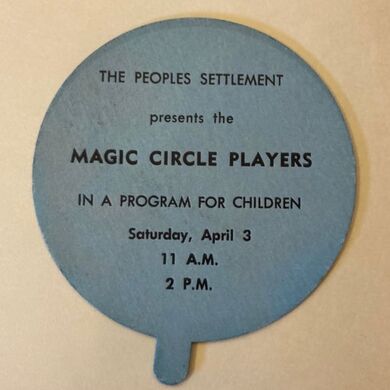|
In 1964, my then husband, son, and I moved to Delaware from Rhode Island where we had both been involved in creating theatre for children. As adults, we performed traditional plays for children, which was well-done, but left me emotionally unsatisfied. I wanted to create a different kind of theatre for children—one in which children as well as adults participated, where actors with varied points of view helped create the play. I also wanted more diversity in who performed and the subject matter of the play, not just children’s classics. I wanted to make theatre for children that was emotionally and psychologically empowering. I had a dream of creating theatre with people from the city and suburbs, white and Black, young and old, where what I wrote developed from the actors’ interests, bringing who they were into the creation and performance of my play. While looking for teaching jobs, I volunteered at Peoples’ Settlement, an organization in inner city Wilmington, serving a mostly Black Community. I started teaching dance and movement, invigorated by the children’s enthusiasm. One day I asked the girls in my dance class if they’d been to the theatre. Some shook their heads; others didn’t know what theatre was. I decided to bring theatre to them.
I talked with the director of the settlement house and received his permission to write a play with characters formed around whoever showed up for the audition. His only condition was that I use some local people. At 6:45 the night of the audition that began at 6pm, the room was empty except for my husband and me. I was upset but told myself I’d done what I could. I was getting ready to pack up when people started coming in. Pretty soon I was answering questions about the play, casting, rehearsals, and performance dates—almost none of which I’d thought about. But, I told them I would make a scenario and we would build the play together, that they would be part of the playmaking. I asked how many were interested. All hands went up. I told them they were all welcome to participate. One man, who looked as if bending any of his joints was painful, told me he loved theatre and felt bad he couldn’t be in the play. “Why not?” I asked. “I’m like a stick. How can I be an actor?” “I’ll write a part for a man who moves in his own way. You have a lovely voice. You’ll do fine.” He was incredulous. I kept telling him he could be in the play. He kept thanking me. I think he would have continued thanking me all night had the janitor not told us it was time to leave. I took note of who had come, what they looked like, and how I might create a drama that would fit their capabilities. I titled the scenario, “Showdown at the Hoedown,” a sort of western theme, organized rehearsal times around their schedules, and with their input, set the performance dates. My dream of having an interracial, mixed ages, urban and suburban cast was now a work in progress. Early on I decided I wanted to have live music but didn’t know how to make this happen. At each practice I invited local kids to watch rehearsals to give me feedback as to what they thought. One day, a boy came with a flute. I asked if he’d like to play when we needed music. He said he didn’t want to do it alone but had friends who played, could he invite them. I was thrilled. One afternoon, when the boys (all Black, between 8 and 12 years old) and I were working on a theme for the play, there was a knock on the door of the house where we were practicing. I opened the door and my heart sank. There stood a very large white policeman asking to come in. I couldn’t think of what I’d done wrong, yet I was a white woman in a room with a group of Black boys—not a common occurrence in this neighborhood. Were we making too much noise? Had I broken a law I didn’t know about? “Can I help you Sir?” I asked, my voice trembling. “I heard music and thought I’d check it out,” he said, walking into the room, filling the space with his uniformed presence. The boys seemed unfazed. I explained about the play and the band’s contribution. Joshua, the boy who acted as leader said, “This’s the theme we’re working on. It’s improvisation you know.” They played for a couple of minutes, then stopped. The policeman was visibly impressed. “You guys sound great. Seems like it’s gonna be a good show. I’ll bring my kids and wife to see it.” After he left, the boys looked at me, grinning. Joshua was laughing as he pointed his finger at me. “You were scared. I could tell, you were really scared.” They thought it was funny that I’d been so tense. The rehearsal continued for another hour. Word got around. People offered to help. We made the tickets out of donated ice cream cup covers. 25 cents for adults, 10 cents for kids. A local artist designed the program and the cup cover information. I invited some older boys, not knowing they were a gang, to watch the room where cast members left their clothes and valuables, and to help older people down the stairs. The afternoon of the first performance no one in the audience laughed. I quickly realized they didn’t know it was okay and rushed upstairs to get a man in the office with a booming laugh to attend. Once the kids heard him laugh, they joined in. The performance was a big success, but afterward, the audience wouldn’t leave. Joshua told me, “I know what to do. Don’t worry.” The musicians, like the pied piper, began playing as they walked up the stairs, the audience following them, giving us time to set up for the second performance. Half an hour later, the second performance began, with many from the first audience coming again. So many people wanted to attend—we had to stay within the limit set by the fire department—we added performances, promising that everyone who wanted to attend would have the chance. At the end of the evening, cast members retrieved their belongings. Nothing was missing. The cast, gang, settlement staff, and I enjoyed a potluck dinner arranged by women in the community. With tears in my eyes, I told them how grateful I was they made it possible for my theatre dream to come true. What do you dream of doing?
2 Comments
I loved the ice cream tops as tickets-- how ingenious to make use of seemingly useless things.
Reply
Marlene Simon
12/8/2022 02:39:29 pm
Another wonderful, heart-warming story and experience. I could visualize everything. Your stories are so vivid and lovely. I am so very glad that you are sharing them with us and that we can have a peek into your amazing life.
Reply
Leave a Reply. |
Monthly StoriesStories inspired by world tales to challenge and comfort. Archives
July 2024
Categories |
Copyright © Nancy King 2020 | Site Design by Angulo Marketing & Design
|
|
Nancy King is a widely published author and a professor emerita at the University of Delaware, where she has taught theater, drama, playwriting, creative writing, and multidisciplinary studies with an emphasis on world literature. She has published seven previous works of nonfiction and five novels. Her new memoir, Breaking the Silence, explores the power of stories in healing from trauma and abuse. Her career has emphasized the use of her own experience in being silenced to encourage students to find their voices and to express their thoughts, feelings, and experiences with authenticity, as a way to add meaning to their lives.
|


 RSS Feed
RSS Feed